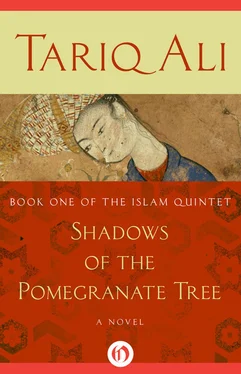Tariq Ali - Shadows of the Pomegranate Tree
Здесь есть возможность читать онлайн «Tariq Ali - Shadows of the Pomegranate Tree» весь текст электронной книги совершенно бесплатно (целиком полную версию без сокращений). В некоторых случаях можно слушать аудио, скачать через торрент в формате fb2 и присутствует краткое содержание. Жанр: Современная проза, на английском языке. Описание произведения, (предисловие) а так же отзывы посетителей доступны на портале библиотеки ЛибКат.
- Название:Shadows of the Pomegranate Tree
- Автор:
- Жанр:
- Год:неизвестен
- ISBN:нет данных
- Рейтинг книги:4 / 5. Голосов: 1
-
Избранное:Добавить в избранное
- Отзывы:
-
Ваша оценка:
- 80
- 1
- 2
- 3
- 4
- 5
Shadows of the Pomegranate Tree: краткое содержание, описание и аннотация
Предлагаем к чтению аннотацию, описание, краткое содержание или предисловие (зависит от того, что написал сам автор книги «Shadows of the Pomegranate Tree»). Если вы не нашли необходимую информацию о книге — напишите в комментариях, мы постараемся отыскать её.
The savagery of the Reconquest tore apart the world of the Banu Hudayl family. For the doomed Muslims of late-fifteenth-century Spain, the approaching forces of Christendom bring not peace but the sword. Capturing the brutality of a war both military and cultural — and the price paid by the innocent — Tariq Ali opens his Islam Quintet with a harrowing and profound historical fiction.
Shadows of the Pomegranate Tree — читать онлайн бесплатно полную книгу (весь текст) целиком
Ниже представлен текст книги, разбитый по страницам. Система сохранения места последней прочитанной страницы, позволяет с удобством читать онлайн бесплатно книгу «Shadows of the Pomegranate Tree», без необходимости каждый раз заново искать на чём Вы остановились. Поставьте закладку, и сможете в любой момент перейти на страницу, на которой закончили чтение.
Интервал:
Закладка:
That night Zuhayr was disturbed by a dream. He woke up in a sweat, trembling. He had seen the house in al-Hudayl swathed by a tent of white muslin. Yazid, the only one he could recognize, was laughing, but not as Zuhayr remembered him. It was the laugh of an old man. He was surrounded by giant chess pieces which had come to life and were talking in a strange language. Slowly, they moved towards Yazid and began to throttle him. The eerie laughter turned into a rattle.
Zuhayr lay there shivering. Sleep would not return. He stayed in the bed, wide awake, huddled in his quilt, desperately awaiting the first noises which come with the dawn.
‘There is only one Allah and it is Allah and Mohammed is his Prophet!’
The same words. The same rhythm. Eight different voices. Eight echoes competing with each other. Eight mosques for the faithful today. And tomorrow? Zuhayr was already dressed. In the giant courtyard below he could already hear the sound of hoofs. His steed was saddled and a stable-boy, not much older than Yazid, was feeding it a lump of raw brown sugar. More hoofs entered the yard. He heard the voices of Ibn Basit and Ibn Amin.
They rode out of the Funduq, through the tiny streets, in the livid light of dawn, just as Gharnata was beginning to come to life. Doors were opening as groups of men made haste to their mosques. As they passed some open doors, Zuhayr could see people busy at their ablutions, trying to wash away the cumulative stench of sleep.
The city was no longer deserted, as it had been when Zuhayr had walked to the Funduq from his uncle’s establishment late last night but it was immersed in despair. Ibn Basit could not recall a time when so many people had hurried to attend morning prayers.
Before the Reconquest it was the Friday afternoon prayers which had attracted the largest crowd — a social and political as well as a religious occasion. More often than not, the Imam would discuss political and military matters, leaving religion for those weeks when nothing else was happening. The mood was usually relaxed, in sharp contrast to the subdued silences of the people today.
‘Zuhayr al-Fahl,’ said Ibn Amin in an excited voice. ‘Ibn Basit and I have two gifts to deliver at the al-Hamra. Would you care to ride there with us? The others are waiting outside the city. The Forty have become the Three Hundred!’
‘What gifts?’ asked Zuhayr, who had noticed the exquisite wooden boxes sealed with silken ribbons. ‘The stench of perfume is overpowering.’
‘One box is for Ximenes,’ replied Ibn Basit, trying very hard to keep a serious face, ‘and the other is for the Count. It is a farewell present which these grandees will never forget.’
Zuhayr regarded the gesture as unnecessary. It was taking chivalry to an absurd degree, but he agreed to accompany them. Within a few minutes they were at the gates of the palace.
‘Stop where you are!’ Two young soldiers drew their swords and rushed towards them. ‘What is your business?’
‘My name is Ibn Amin. Yesterday the Captain-General visited us in the city and invited us to have breakfast with him this morning. He made some requests and wanted our reply by this morning. We have brought a gift for him and for His Grace the Archbishop of Toledo. Unfortunately we cannot stay. Will you please convey our apologies and make sure that these gifts, a small token of our esteem, are delivered to the two gentlemen, the minute they have arisen.’
The soldiers relaxed and accepted the gifts in good humour. The young men turned their horses and galloped away to join their fellow fighters, where they had gathered just outside the city. Soldiers at the gate watched with grim faces as they passed through.
Three hundred armed men on horseback, most of them not yet twenty, cannot be expected to remain silent on the edge of change. There were screams, whisperings and excited laughter. The mountain air was chilly and both men and horses were swathed in steam. Anxious mothers, huddled in their shawls, were saying their farewells beneath the walls. Zuhayr frowned at the din, but his mood changed as he neared his troops. They were a magnificent sight, a sign that the Moors of Gharnata had not abandoned hope. As the three friends rode up to the assembled company, they were greeted by excited cries and a warm welcome. All were aware of the dangers that faced them, but despite that knowledge, spirits were high.
‘Did you deliver the presents?’ asked Ibn Wahab as they were leaving the city behind.
Ibn Amin nodded and laughed.
‘In the name of Allah,’ asked Zuhayr, ‘what is the joke?’
‘You really want to know?’ teased Ibn Basit. ‘Ibn Amin, you tell him.’
The son of the Count’s personal physician laughed so much at this suggestion that Zuhayr thought he would choke.
‘The stench of perfume! Your nose detected our crime,’ began Ibn Amin after he had calmed down. ‘In both those boxes, disguised by the attar of roses, is a rare delicacy for the consumption of the Archbishop and the Count. It has edible silver paper transferred on to its surface. What we have left them, Zuhayr al-Fahl, is a piece of our excrement. One, freshly delivered this morning from the bowels of this Jew you see before you, and the other, a somewhat staler offering, from the insides of a devout Moor, known to you as Ibn Basit. This fact, without mentioning our actual names, of course is made clear in a note addressed to both of them, in which we also express the hope that they will enjoy their breakfast.’
It was too childish for words. Zuhayr tried his best not to laugh, but found it increasingly difficult to contain himself. He began to guffaw uncontrollably. It did not take long for word of the prank to spread to the entire group. Within a few minutes the gallant three hundred were engulfed by a wave of laughter.
‘And to think as I did,’ said Zuhayr, as he tried to calm himself down, ‘that you were being far too sentimental and chivalrous.’ This made his friends laugh again.
They rode on for a few hours. The sun had risen. There was no wind at all. Capes and blankets were discarded and handed to the hundred or so servants who were attending their masters. It was after they had been riding for over two hours that they observed a small group of horsemen riding towards them.
‘Allahu Akbar! God is Great!’ shouted Zuhayr, and the chant was repeated by the young men of Gharnata.
There was no reply from the horsemen. Zuhayr ordered his troop to halt, fearing an ambush. It was when the horsemen drew close that Zuhayr recognized them. His spirits rose considerably.
‘Abu Zaid al-Ma’ari!’ he shouted with pleasure. ‘Peace be upon you! You see I followed your advice after all and brought some other friends along.’
‘I am happy to see you, Zuhayr bin Umar. I knew you were headed this way. You had better follow us and get away from this particular track. It is too well known, and by this time there will already be soldiers on your tail, trying to determine where you will camp for the night.’
Zuhayr told him about the gifts they had left behind for the Count and the Archbishop. To his surprise Abu Zaid did not laugh.
‘You have done something very stupid, my friends. The kitchen in the al-Hamra is probably enjoying your joke, but they are the least powerful people in the palace. You have united the Count and the Confessor. A gift to the priest would have been sufficient. It might even have amused the Count and delayed the offensive. Did you really think that you were the first to have thought of such an insult? Others like you, all over al-Andalus, have executed similar pieces of folly. It is getting late. Let us get out of this district as soon as possible.’
Zuhayr smiled to himself. He was a courageous young man, but not completely bereft of intelligence. He knew that his capacities did not extend to leading an irregular mountain army. Abu Zaid’s presence had relieved his burden considerably.
Читать дальшеИнтервал:
Закладка:
Похожие книги на «Shadows of the Pomegranate Tree»
Представляем Вашему вниманию похожие книги на «Shadows of the Pomegranate Tree» списком для выбора. Мы отобрали схожую по названию и смыслу литературу в надежде предоставить читателям больше вариантов отыскать новые, интересные, ещё непрочитанные произведения.
Обсуждение, отзывы о книге «Shadows of the Pomegranate Tree» и просто собственные мнения читателей. Оставьте ваши комментарии, напишите, что Вы думаете о произведении, его смысле или главных героях. Укажите что конкретно понравилось, а что нет, и почему Вы так считаете.












